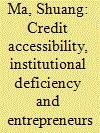| Srl | Item |
| 1 |
ID:
170093


|
|
|
|
|
| Summary/Abstract |
Using a brand new data, we document seriously low credit accessibility from financial institutes for small and micro enterprises (SMEs) and examine whether and how it affects entrepreneurial activity in China. We find that credit constraints significantly decrease the possibility of households becoming entrepreneurs. Based on our estimates, 10% decrease in the probability of being credit constrained would be associated with 4.3 million newly-created household businesses, or equivalently 11 million jobs. In the end, factors that determine credit accessibility are exploited and the result indicates that institutional deficiency plays a role in shaping the pattern of financing difficulties in China. Specifically, we find households in regions with more commercialized banking or those with government-sector workers are more likely to access to credit when other relevant variables are conditioned. In particular, the positive role of government-sector workers is more pronounced in regions with weaker market institutions.
|
|
|
|
|
|
|
|
|
|
|
|
|
|
|
|
| 2 |
ID:
170345


|
|
|
|
|
| Summary/Abstract |
The reform of the shareholding system for collective assets (SSCA) has made clear the community members' rights to collective assets and their possessory rights, while changes in the residents' rights may alter their behaviors and community interests. In this study, the Difference-in-Differences estimation method is used to examine the impact of the SSCA reform on residents' participation in community governance. With residents' participation as the mediating factor, the mediating effect model is used to study the impact of the reform on community debts risk (CDR). When the household, community, and economic variables are controlled, the probability of residents in communities that have undergone reform being willing to participate in community governance is 5.6% higher than those in communities that have not. The results are significant at the 5% level. In terms of CDR, the SSCA reform has significantly reduced the debts–assets ratio by 7.9%. These findings have passed a series of robustness tests. This conclusion provides new ideas for promoting communities' democratic participation and debts risk management.
|
|
|
|
|
|
|
|
|
|
|
|
|
|
|
|